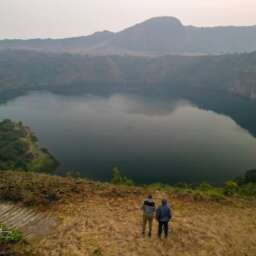(Business in Cameroon) – In Bonaberi, along National Road No. 3, Joel Sikam runs Fisco Industries, a company rooted in the manufacturing sector. His daily routine revolves around managing production and processing local raw materials, with all the challenges this entails. His perspective reflects that of an industrialist directly experiencing the effects of public policies. In this interview, he discusses the evolution of the industrial sector, the challenges of local production, the impact of import-substitution measures, and the prospects for industrialization in the years ahead.
Business in Cameroon: You worked at Morgan Stanley, a global finance giant, where you could have built an international career. Yet you chose to return to Cameroon, your home country, to create Fisco Industries. Since its launch in 2015 with only four employees, you now have nearly thirty. How did you achieve such progress in an environment many see as unfavorable to entrepreneurship?
Joel Sikam: My time at Morgan Stanley gave me a true passport to the world, at a moment when I was deeply questioning my role in Africa’s transformation. Joining the institution at the height of the 2008 subprime crisis was a major learning experience. I understood two key things: the colossal impact of the economy on global life and the close interconnection between national economies.
That experience gave me a global perspective, but also the conviction that I wanted to be an actor, not a spectator, of change on our continent. Returning to Cameroon was not about nostalgia, but the certainty that my added value would be stronger here than elsewhere.
Returning to Cameroon was not about nostalgia, but the certainty that my added value would be stronger here than elsewhere.
I observed that more and more Africans from the diaspora were returning, while at the same time foreigners were settling on the continent. Something was happening. I wanted to be part of it. In 2015, we were four. Today, we are more than thirty. This is not a miracle. It is the result of a clear vision, deep roots in the local market, hard work, and relentless discipline in execution. Where many saw only constraints and uncertainty, I saw opportunities and huge room for maneuver, provided one remains constant, coherent, and determined.
Business in Cameroon: As a young entrepreneur, what were the main challenges you faced at the start in Cameroon, and over the past seven years, which obstacles marked you most?
Joel Sikam: The first shock was the harsh reality on the ground. I always stayed close to Cameroon, even after leaving as a teenager, and I followed the news from afar. I also watched the entrepreneurial paths of relatives, but I did not fully grasp the scale of their challenges. On the ground, reality can quickly be disillusioning. Inadequate infrastructure, costly logistics, slow administrative procedures, scarce and sometimes underqualified labor. Coming from an environment where everything is structured and predictable, Cameroon teaches you quickly to cope with the unexpected and embrace complexity.
Coming from an environment where everything is structured and predictable, Cameroon teaches you quickly to cope with the unexpected and embrace complexity.
There is also the learning curve specific to our ecosystem: the high cost of doing business, the gap between certain economic orientations and market realities. But the biggest challenge remains mental. Each morning, you must accept uncertainty and setbacks while still believing in your project, even when everything seems against it. And you must convince partners, clients, and teams that the struggle is worth it.
Business in Cameroon: Despite these difficulties, your company has grown significantly. Beyond your personal entrepreneurial qualities, what positive aspects of the regulatory environment or overall business climate in Cameroon supported this organic growth?
Joel Sikam: We grew because the Cameroonian market is evolving. Demand for quality, locally made industrial products is rising fast. This organic growth is supported by several factors: a dynamic population, the emergence of new consumption patterns driven by the rise of supermarkets, and a strong trend toward “buy local.” Some public policies, though not perfect, have also opened space for national production and encouraged local initiatives.
Business in Cameroon: What specific expectations do you have of Cameroonian authorities in terms of public policy, economics, and regulation to strengthen your impact and help multiply entrepreneurial initiatives like yours?
Joel Sikam: Our first expectation is clarity. Industry cannot thrive in uncertainty. We need a simple, stable framework, working infrastructure, reliable energy, and financing adapted to the long timelines of industry. We also need smart protection against unfair imports—not to isolate ourselves, but to give local industry the oxygen it needs to grow. This can only happen if the private and public sectors engage in constant dialog with a shared goal: the sustainable transformation of our country.
Business in Cameroon: With seven years of entrepreneurial experience in Cameroon, what are the major lessons you have learned, and what practical advice would you give young entrepreneurs looking to start an industrial or manufacturing business today?
Joel Sikam: Patience is capital. In industry, nothing is built in one quarter. Operational discipline is not optional. Even in an imperfect environment, you must aim for excellence. And you must be ready to reinvent yourself constantly.

To young entrepreneurs, I say start small, but with giant standards. Invest as much in people as in machines and processes. The first order you deliver is already your business card for the next ten years. Be demanding, be rigorous.
Business in Cameroon: What is your medium-term vision for Fisco Industries in terms of regional or continental expansion, and what opportunities do you see for further developing your model in other African countries?
Joel Sikam: In five years, Fisco Industries will be more than a company; it will be a structuring player in the regional industrial landscape. We are aligned with the implementation of the AfCFTA, especially since the integration of ECCAS. Fisco Industries is already deploying Cameroonian know-how in high-consumption and high-demographic countries such as the DRC, Côte d’Ivoire, and Nigeria. The AfCFTA represents a unified market with the potential of more than one billion consumers, and Fisco is ready to accelerate its integration into this regional dynamic.

































